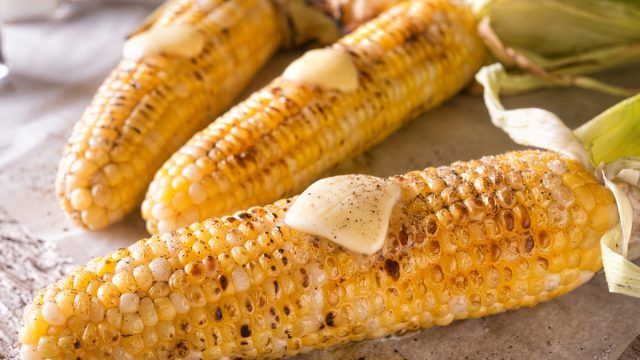Evidence-Based Surprising Side Effects of Eating Corn, Says Science.
corn on cob.
This tasty vegetable has some surprising benefits for your whole body health.
Whether you love cornbread, corn chowder, or just enjoy adding some fresh kernels to your favorite salad, corn is a staple food in countless homes around the world. However, it's not just the versatility of this tasty vegetable that makes it such a great addition to meals—it also confers plenty of health benefits even the biggest connoisseurs may not recognize. Read on to discover the side effects of eating corn, according to science.
These 5 points benefits of eating cornbread improves your health.
1. Corn may lower your cholesterol.
medical device for measuring cholesterol with stethoscope on the table.
If you want to get your cholesterol into healthier territory, adding some corn oil to your diet may be an effective means of doing so. A 2018 study published in The Journal of Nutrition found that, among a group of 25 adults with high cholesterol, consuming four tablespoons of corn oil per day lowered cholesterol levels by greater proportions than those who consumed an equivalent amount of coconut oil.
2. Corn may reduce your risk of diabetes.
woman-measuring-blood-sugar-diabetes
A little purple corn on your menu could be the key to keeping diabetes and its associated complications at bay. A 2018 in vitro study published in PLOS One found that the anthocyanin pigments found in purple corn were associated with improved glucose uptake and increased insulin secretion, as well as activating free fatty acid receptor-1 and glucokinase, two biological markers associated with a reduction in diabetes risk.
3. Corn may improve your digestion.
Door handle open to toilet can see toilet.
If you're trying to give your sluggish digestive tract a boost, a little corn might just do the trick. A 2013 study published in The Journal of Nutrition found that consumption of polydextrose and soluble corn fiber, two types of fiber found in corn, was associated with more frequent stool production.
4. Corn may improve your gut bacteria.
happy woman hands on belly.
A healthy balance of gut bacteria is essential for not only keeping your digestive tract healthy, but promoting whole-body wellbeing, as approximately 70 percent of your body's immune system is located within the gut.
Fortunately, adding some corn to your diet may help keep this essential balance intact. A 2016 study published in PLOS One found that soluble corn fiber had a prebiotic effect, increasing the amount of beneficial bifidobacteria in the digestive tract of study subjects.
5. Corn may keep you fuller for longer.
two people in sweaters putting their hands into a bowl of popcorn.
Enjoying some air-popped popcorn as a snack could help you stay satisfied between meals without turning to high-calorie snacks. A study published in the European Journal of Nutrition ranked popcorn as having a 154% satiety index, using white bread as a baseline comparison with a 100% satiety index. What's more, a 2012 study published in Nutrition Journal found that low-fat popcorn was more satiating than high-fat potato chips.
For more insight into the benefits of this a-maize-ing vegetable, check out What Happens To Your Body When You Eat Corn.





Comments
Post a Comment